2014高考英语二轮复习精讲 情态动词和虚拟语气
- 格式:doc
- 大小:561.52 KB
- 文档页数:10
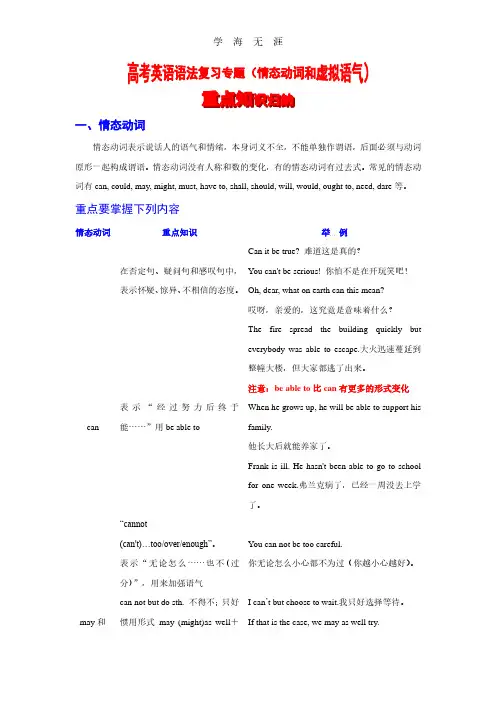
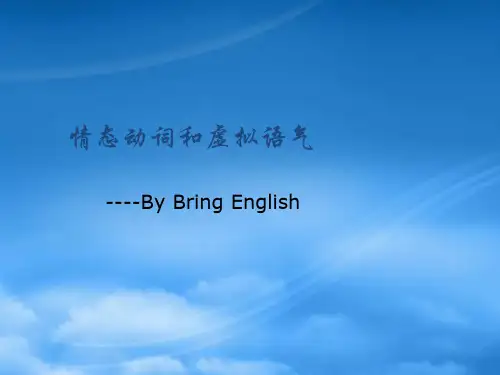
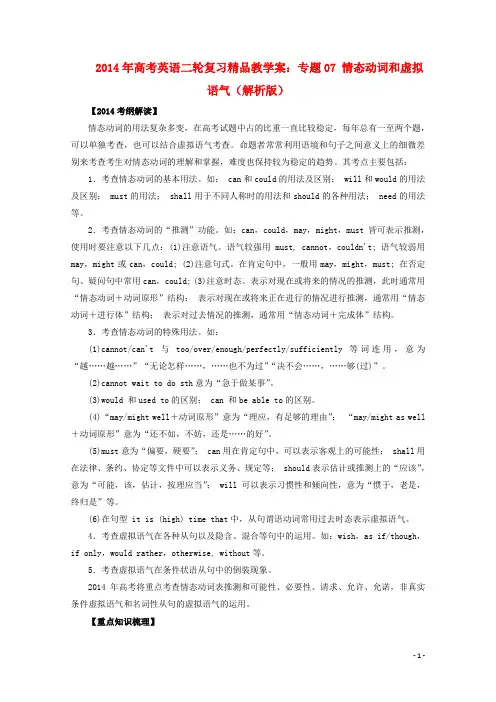
2014年高考英语二轮复习精品教学案:专题07 情态动词和虚拟语气(解析版)【2014考纲解读】情态动词的用法复杂多变,在高考试题中占的比重一直比较稳定,每年总有一至两个题,可以单独考查,也可以结合虚拟语气考查。
命题者常常利用语境和句子之间意义上的细微差别来考查考生对情态动词的理解和掌握,难度也保持较为稳定的趋势。
其考点主要包括:1.考查情态动词的基本用法。
如: can和could的用法及区别; will和would的用法及区别; must的用法; shall用于不同人称时的用法和should的各种用法; need的用法等。
2.考查情态动词的“推测”功能。
如:can,could,may,might,must 皆可表示推测,使用时要注意以下几点:(1)注意语气。
语气较强用must, cannot,couldn't; 语气较弱用may,might或can,could; (2)注意句式。
在肯定句中,一般用may,might,must; 在否定句、疑问句中常用can,could; (3)注意时态。
表示对现在或将来的情况的推测,此时通常用“情态动词+动词原形”结构;表示对现在或将来正在进行的情况进行推测,通常用“情态动词+进行体”结构;表示对过去情况的推测,通常用“情态动词+完成体”结构。
3.考查情态动词的特殊用法。
如:(1)cannot/can't 与too/over/enough/perfectly/sufficiently 等词连用,意为“越……越……”“无论怎样……,……也不为过”“决不会……,……够(过)”。
(2)cannot wait to do sth意为“急于做某事”。
(3)would 和used to的区别; can 和be able to的区别。
(4)“may/might we ll+动词原形”意为“理应,有足够的理由”;“may/might as well +动词原形”意为“还不如,不妨,还是……的好”。
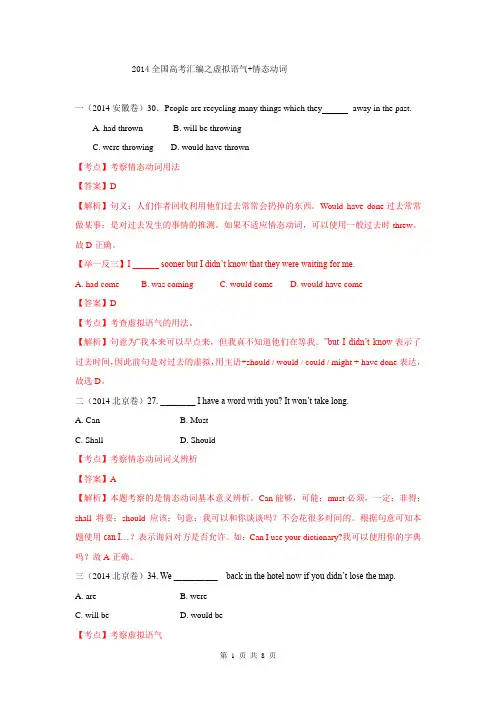
2014全国高考汇编之虚拟语气+情态动词一(2014安徽卷)30.People are recycling many things which they away in the past.A. had thrownB. will be throwingC. were throwingD. would have thrown【考点】考察情态动词用法【答案】D【解析】句义:人们作者回收利用他们过去常常会扔掉的东西。
Would have done过去常常做某事;是对过去发生的事情的推测。
如果不适应情态动词,可以使用一般过去时threw。
故D正确。
【举一反三】I ______ sooner but I didn’t know that they were waiting for me.A. had comeB. was comingC. would comeD. would have come【答案】D【考点】考查虚拟语气的用法。
【解析】句意为“我本来可以早点来,但我真不知道他们在等我。
”but I didn’t know表示了过去时间,因此前句是对过去的虚拟,用主语+should / would / could / might + have done表达,故选D。
二(2014北京卷)27. ________ I have a word with you? It won’t take long.A. CanB. MustC. ShallD. Should【考点】考察情态动词词义辨析【答案】A【解析】本题考察的是情态动词基本意义辨析。
Can能够,可能;must必须,一定;非得;shall将要;should应该;句意:我可以和你谈谈吗?不会花很多时间的。
根据句意可知本题使用can I…?表示询问对方是否允许。
如:Can I use your dictionary?我可以使用你的字典吗?故A正确。
三(2014北京卷)34. We __________ back in the hotel now if you didn’t lose the map.A. areB. wereC. will beD. would be【考点】考察虚拟语气【答案】D【解析】本题考察的是if条件状语从句的虚拟语气。
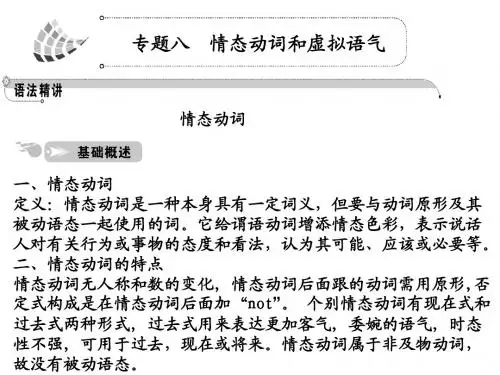
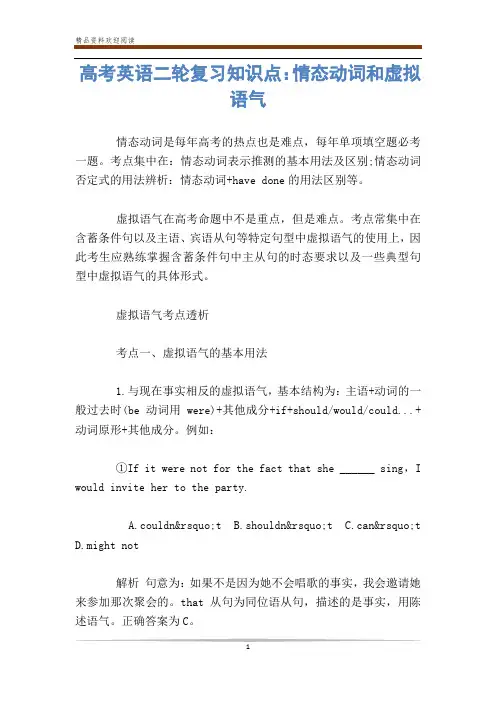
高考英语二轮复习知识点:情态动词和虚拟语气情态动词是每年高考的热点也是难点,每年单项填空题必考一题。
考点集中在:情态动词表示推测的基本用法及区别;情态动词否定式的用法辨析:情态动词+have done的用法区别等。
虚拟语气在高考命题中不是重点,但是难点。
考点常集中在含蓄条件句以及主语、宾语从句等特定句型中虚拟语气的使用上,因此考生应熟练掌握含蓄条件句中主从句的时态要求以及一些典型句型中虚拟语气的具体形式。
虚拟语气考点透析考点一、虚拟语气的基本用法1.与现在事实相反的虚拟语气,基本结构为:主语+动词的一般过去时(be动词用were)+其他成分+if+should/would/could...+动词原形+其他成分。
例如:①If it were not for the fact that she ______ sing,I would invite her to the party.A.couldn’tB.shouldn’tC.can’tD.might not解析句意为:如果不是因为她不会唱歌的事实,我会邀请她来参加那次聚会的。
that从句为同位语从句,描述的是事实,用陈述语气。
正确答案为C。
2.与过去事实相反的虚拟语气,基本结构为:主语+动词的过去完成时+其他成分+if+should/would/could...+have done+其他成分。
例如:If the weather had been better,we could have had a picnic.But it ______ all day.A.rainedB.rainsC.has rainedD.is raining解析句意为:如果天气好的话,我们是能够去野餐的,但是下了一天的雨。
句子前半部分陈述的是与过去事实相反的事情,所以用了虚拟语气。
下了一天的雨是事实,所以用陈述语气。
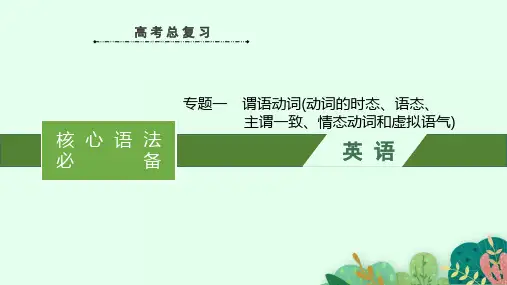
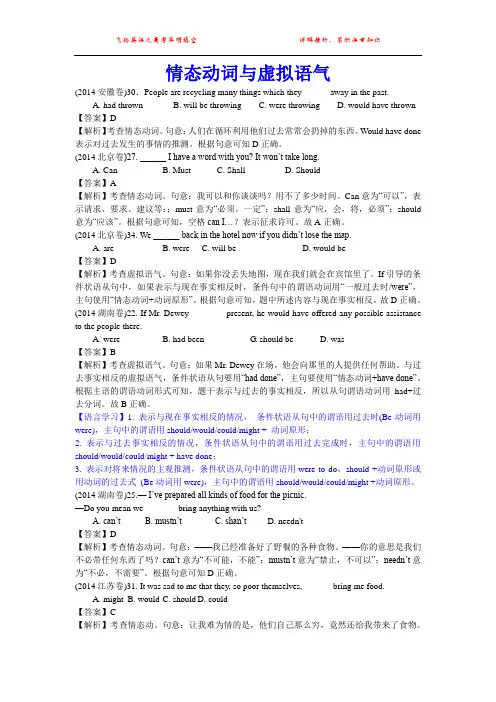
情态动词与虚拟语气(2014安徽卷)30.People are recycling many things which they______ away in the past.A. had thrownB. will be throwingC. were throwingD. would have thrown 【答案】D【解析】考查情态动词。
句意:人们在循环利用他们过去常常会扔掉的东西。
Would have done 表示对过去发生的事情的推测。
根据句意可知D正确。
(2014北京卷)27. ______ I have a word with you? It won’t take long.A. CanB. MustC. ShallD. Should【答案】A【解析】考查情态动词。
句意:我可以和你谈谈吗?用不了多少时间。
Can意为“可以”,表示请求、要求、建议等:;must意为“必须,一定”;shall意为“应,会,将,必须”;should 意为“应该”。
根据句意可知,空格can I…?表示征求许可。
故A正确。
(2014北京卷)34. We ______ back in the hotel now if you didn’t lose the map.A. areB. wereC. will beD. would be【答案】D【解析】考查虚拟语气。
句意:如果你没丢失地图,现在我们就会在宾馆里了。
If引导的条件状语从句中,如果表示与现在事实相反时,条件句中的谓语动词用“一般过去时/were”,主句使用“情态动词+动词原形”。
根据句意可知,题中所述内容与现在事实相反。
故D正确。
(2014湖南卷)22. If Mr. Dewey ______ present, he would have offered any possible assistance to the people there.A. wereB. had been G. should be D. was【答案】B【解析】考查虚拟语气。
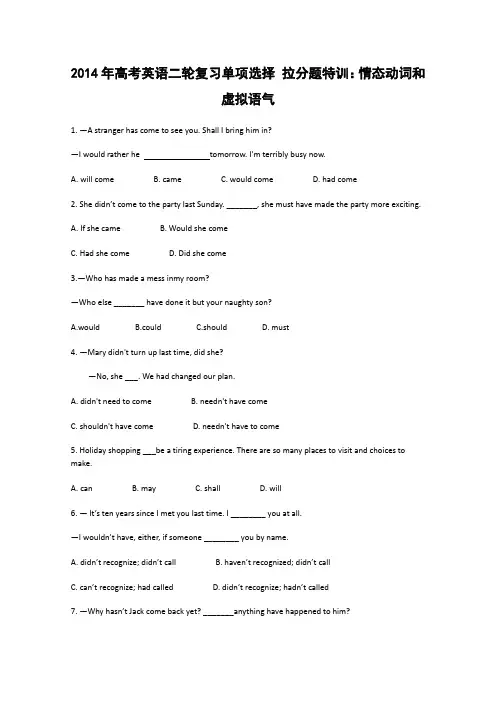
2014年高考英语二轮复习单项选择拉分题特训:情态动词和虚拟语气1. —A stranger has come to see you. Shall I bring him in?—I would rather he tomorrow. I'm terribly busy now.A. will comeB. cameC. would comeD. had come2. She didn’t come to the party last Sunday. _______, she must have made the party more exciting.A. If she cameB. Would she comeC. Had she comeD. Did she come3.—Who has made a mess inmy room?—Who else _______ have done it but your naughty son?A.wouldB.couldC.shouldD. must4. —Mary didn't turn up last time, did she?—No, she ___. We had changed our plan.A. didn't need to comeB. needn't have comeC. shouldn't have comeD. needn't have to come5. Holiday shopping ___be a tiring experience. There are so many places to visit and choices to make.A. canB. mayC. shallD. will6. —It’s ten years since I met you last time. I ________ you at all.—I wouldn’t have, either, if someone ________ you by name.A. didn’t recognize; didn’t callB. haven’t recognized; didn’t callC. can’t recognize; had calledD. didn’t recognize; hadn’t called7. —Why hasn’t Jack come back yet? _______anything have happened to him?—I’m not sure, but I guess something_______.A. May; must haveB. Can; may haveC. Must; mayD. Should; might have8. He_______writing the paper now. He hadn’t written a single word when I left him ten minutes ago.A. shouldn’t beB. can’t have finishedC. can’t beD. mustn’t have finished9. His pale face suggested that he_______really frightened by the accident and we suggestedhe_______a good rest.A. be; hadB. should be; hasC. was; haveD. had been; should have10. —I saw her in the office this morning.—Really?She_______back to work without the doc tor’s permission.A. couldn’t have goneB. needed not to goC. didn’t need to goD. shouldn’t have gone11. —Why did Simon get home so late?—He was so drunk that he_______his way back.A. might not findB. might not have foundC. co uldn’t findD. couldn’t have found12. —“Crash diets” make us lose weight fast and I am all into that.—But it_______better to work out.A. hadB. would beC. wouldn’t have beenD. must have been13. —Do you believe Cecilia has good table manners?—Oh,no. As is known to us all,she_______comb her hair at the table,even though she knows we don’t like it.A. willB. mayC. has got toD. shall14. The law keeps teenagers from getting cigarettes that_______ more freely available.A. haven’t otherwise beenB. had otherwise beenC. would otherwise have beenD. wouldn’t otherwise be15. Belinda_______be allowed to play with that toy all the time just because she’s the eldest.A. wouldn’tB. needn’tC. mustn’tD.daren’t16. We played really poorly in the first half. We_______,however,feel that we were very lucky indeed. After all,the score is tied.A. wouldB. couldC. shouldD. might17. A judge has ruled the strike is illegal,and ordered that the union_______$2 million a day.A. was finedB. be finedC. is finedD. would be fined18. I_______here earlier. I never thought the car would break down halfway.A. could comeB. should comeC. would have comeD. may have come19. Many students will take part in the school sports meeting this week,so she suggested that the class meeting_______held on Saturday.A. not beB. not to beC. be notD. be not to20. Luckily the man missed the high- speed train to Wenzhou, or he_____have been killed in the accident.A. mustB. wouldC. shouldD. might21. I got close enough to hear them speaking Chinese, and I said “Ni Hao”, just as I_____do in China.A. mustB. mightC. canD. should22. One of our rules is that every student_____ wear school uniform while at school.A. mightB. couldC. shallD. will23. —Happy birthday!—Thank you! It’s the best present I______for.A. should have wishedB. must have wishedC. may have wishedD. could have wished24. Days later, my brother called to say he was all right, but______say where he was.A. mustn’tB. shouldn’tC. wouldn’tD. mightn’t25. We______the difficulty together, but why didn’t you tell me?A. should faceB. might faceC. could have facedD. must have faced26. I_____ thank you too much for all your help to my son while we were away from home.A. won’tB. can’tC. canD. wil27.—Did you meet with Mr. Jackson?—I had come here a little earlier.A. If onlyB. Only ifC. But forD. For fear28. Terry threw out his arm just in time to stop you falling down the stairs. Otherwise, I_____you black and blue all over now.A.see B.will see C.would see D.would have seen29. Before space travel, an astronaut must know_____it might feel like to stay in an imaginary environment.A.when B.what C.how D.that30. ______for the free vegetables, women workers would not have gone to the supermarket so often.A.Ifit is not B.Were it not C.Had it not been D.If they were not31.(The policeman declared that the blow on the boy’s head _____from behind.A.should have been madeB.must have been madeC.would have been madeD.could have been made32. If the wound______become swollen, do not hesitate to call me.A.shallB. mustC. shouldD. would33. I actually believe that we _____ in Xi’an now if you hadn’t been caught drunk driving last month.A. would beB. would have beenC. wereD.had been34. Thank you for all your hard work last week.I don’t think we_______it without you.A. can manageB. could have managedC. could manageD. can have managed35. But for their help, we_________ the program in time.A. can not finishB. will not finishC. had not finishedD. could not have finished36. But for the help of my English teacher, I_______the first prize in the English Writing Competition.A. would not winB. would not have wonC. would winD. would have won37. This printer is of good quality. If it_______break down within the first year, we would repair it at our expense.A. wouldB. shouldC. couldD. might38.He did not regret saying what he did but felt that he_______it differently.A. could expressB. would expressC. could have expressedD. must have expressed39. George is going to talk about the geography of his country, but I’d rather he_______more on its culture.A. focusB. focusedC. would focusD. had focused40. Had I known about this computer program, a huge amount of time and energy_______.A. would have been savedB. had been savedC. will be savedD. was saved41. We_______John’s name on the race list yesterday but for his recent injury.A. will putB. will have putC. would putD. would have put42. I_______through that bitter period without your generous help.A. couldn’t have goneB. didn’t goC. wouldn’t goD. hadn't gone43. I_______sooner but I didn’t know that they were waiting for me.A. had comeB. was comingC. would comeD. would have come44. —Pity you missed the lecture on nuclear pollution.—I_______it, but I was busy preparing for a job interview.A. attendedB. had attendedC. would attendD. would have attended45. Maybe if I_______science, and not literature then, I would be able to give you more help.A. studiedB. would studyC. had studiedD. was studying46. —Where is my dictionary? I remember I put it here yesterday.—You_______it in the wrong place.A. must putB. should have putC. might putD. might have put47. The teacher_______have thought Johnson was worth it or shewouldn’t have wasted time on him, I suppose.A. shouldB. canC. wouldD. must48. She_______have left school, for her bike is still here.A. can’tB. wouldn’tC. shouldn’tD. needn’t49. Jack described his father, who_______a brave boy many years ago, as a strong-willed man.A. would beB. would have beenC. must beD. must have been50. —Good morning. I’ve got an appointment with Miss Smith in the Personnel Department.—Ah, good morning. You_______be Mrs. Peters.A. mightB. mustC. wouldD. can51. It_______be the postman at the door. It’s only six o’clock.A. mustn’tB. can’tC. won’tD. needn’t52. —I left my handbag on the train, but luckily someone gave it to a railway official.—How unbelievable to get it back! I mean, someone_______it.A. will have stolenB. might have stolenC. should have stolenD. must have stolen53. The biggest problem for most plants, which_______just get upand run away when threatened, is that animals like to eat them.A. shan’tB. can’tC. needn’tD. mustn’t54. —What does the sign over there read?—"No person_______smoke or carry a lighted cigarette, cigar or pipe in this area."A. willB. mayC. shallD. must55. —Turn off the TV, Jack._______your homework now?—Mum, just ten more minutes, please.A. Should you be doingB. Shouldn’t you be doingC. Couldn’t you b e doingD. Will you be doing56. —What do you think we can do for our aged parents?—You_______do anything except to be with them and be yourself.A. don't have toB. oughtn't toC. mustn'tD. can't57. Peter_______be really difficult at times ev en though he’s anice person in general.A. shallB. shouldC. canD. must58. It is usually warm in my hometown in March, but it___________be rather cold sometimes.A. mustB. canC. shouldD. would59. One of the few things you_______say about English people with certainty is that they talk a lot about the weather.A. needB. mustC. shouldD. can60.Just be patient. You_______expect the world to change so soon.A. can'tB. needn'tC. may notD. will not参考答案1. B2. C3.B4.A5. A6. D7. B8. B9. C10. D11. C 12. B13. A14. C15. C16. C17. B18. C19. A20.D21.B 22.C23.D24.C25.C26.B27.A28.C29.B30.C31.B 32.C 33.A34.B35.D36.B37.B38.C39.B40.A41.D42.A 43.D44.D45.C46.D47.D48.A49.D50.B 51.B52.B53.B 54.C55.B56.A57.C58.B59.D60.A。
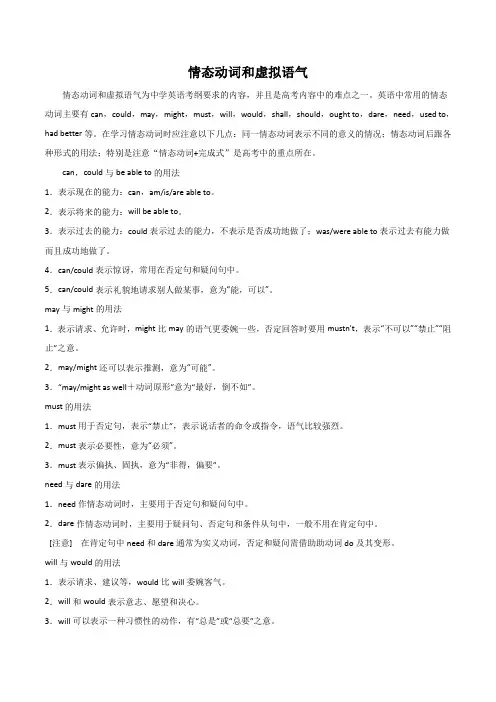
情态动词和虚拟语气情态动词和虚拟语气为中学英语考纲要求的内容,并且是高考内容中的难点之一。
英语中常用的情态动词主要有can,could,may,might,must,will,would,shall,should,ought to,dare,need,used to,had better等。
在学习情态动词时应注意以下几点:同一情态动词表示不同的意义的情况;情态动词后跟各种形式的用法;特别是注意“情态动词+完成式”是高考中的重点所在。
can,could与be able to的用法1.表示现在的能力:can,am/is/are able to。
2.表示将来的能力:will be able to。
3.表示过去的能力:could表示过去的能力,不表示是否成功地做了;was/were able to表示过去有能力做而且成功地做了。
4.can/could表示惊讶,常用在否定句和疑问句中。
5.can/could表示礼貌地请求别人做某事,意为“能,可以”。
may与might的用法1.表示请求、允许时,might比may的语气更委婉一些,否定回答时要用mustn't,表示“不可以”“禁止”“阻止”之意。
2.may/might还可以表示推测,意为“可能”。
3.“may/might as well+动词原形”意为“最好,倒不如”。
must的用法1.must用于否定句,表示“禁止”,表示说话者的命令或指令,语气比较强烈。
2.must表示必要性,意为“必须”。
3.must表示偏执、固执,意为“非得,偏要”。
need与dare的用法1.need作情态动词时,主要用于否定句和疑问句中。
2.dare作情态动词时,主要用于疑问句、否定句和条件从句中,一般不用在肯定句中。
[注意]在肯定句中need和dare通常为实义动词,否定和疑问需借助助动词do及其变形。
will与would的用法1.表示请求、建议等,would比will委婉客气。
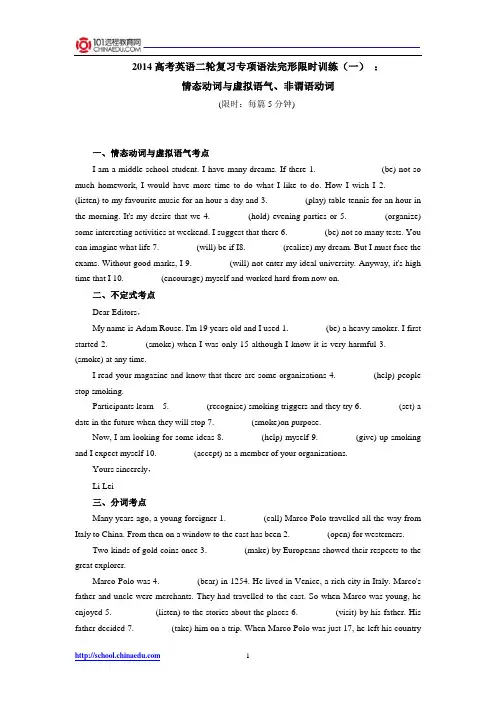
2014高考英语二轮复习专项语法完形限时训练(一):情态动词与虚拟语气、非谓语动词(限时:每篇5分钟)一、情态动词与虚拟语气考点I am a middle school student. I have many dreams. If there 1.________ (be) not so much homework, I would have more time to do what I like to do. How I wish I 2.________ (listen) to my favourite music for an hour a day and 3.________ (play) table tennis for an hour in the morning. It's my desire that we 4.________ (hold) evening parties or 5.________ (organize) some interesting activities at weekend. I suggest that there 6.________ (be) not so many tests. You can imagine what life 7.________ (will) be if I8.________ (realize) my dream. But I must face the exams. Without good marks, I 9.________ (will) not enter my ideal university. Anyway, it's high time that I 10.________ (encourage) myself and worked hard from now on.二、不定式考点Dear Editors,My name is Adam Rouse. I'm 19 years old and I used 1.________ (be) a heavy smoker. I first started 2.________ (smoke) when I was only 15 although I know it is very harmful 3.________ (smoke) at any time.I read your magazine and know that there are some organizations 4.________ (help) people stop smoking.Participants learn 5.________ (recognise) smoking triggers and they try 6.________ (set) a date in the future when they will stop 7.________ (smoke)on purpose.Now, I am looking for some ideas 8.________ (help) myself 9.________ (give) up smoking and I expect myself 10.________ (accept) as a member of your organizations.Yours sincerely,Li Lei三、分词考点Many years ago, a young foreigner 1.________ (call) Marco Polo travelled all the way from Italy to China. From then on a window to the east has been 2.________ (open) for westerners.Two kinds of gold coins once 3.________ (make) by Europeans showed their respects to the great explorer.Marco Polo was 4.________ (bear) in 1254. He lived in Venice, a rich city in Italy. Marco's father and uncle were merchants. They had travelled to the east. So when Marco was young, he enjoyed 5.________ (listen) to the stories about the places 6.________ (visit) by his father. His father decided 7.________ (take) him on a trip. When Marco Polo was just 17, he left his countryfor China. They were among the first to go along the Silk Road. They had a lot of trouble in 8.________ (explore). So it was a hard trip for Marco Polo, but he was very brave. After about four years, Marco met Kublai Khan who gave him a job. Marco spent 17 years 9.________ (work) for him. He visited most parts of China. He learned lots of 10.________ (interest) things about Chinese life. When he returned home, he let others know about things like coal and paper money. He wrote about his trip in a famous book.四、动名词考点Everyone needs friends. There is an old 1.________ (say): friends are God's way of 2.________ (take) care of us. But how do you find real friendship and keep it?The Care and Keeping of Friends by American author Sally Seamans tells young students some smart ways of 3.________ (find) friends. Sally says 4.________ (arrive) at friendship is just like 5.________ (plant) a tree. You plant the seed and take care of it to make it grow. First, you should choose a friend. What makes a good friend? It is not because a person has money or good looks. A good friend should be kind and patient. For example, if you have a hard day, a good friend should listen to your complaints and do their best 6.________ (help). To make a friend, you cannot be too shy. You should make each other happy and share your life. But things can't always be happy. Even the best friends have fights. What should you do when you have a fight with your friends? You have to talk to them. When there is no one around, have an honest talk. If he or she doesn't want 7.________ (talk), you could write a letter.Sally says there are three steps to 8.________ (be) friends again. Tell him or her how you are feeling, say what your friend has done wrong, and explain why you did this or that. The book also has advice on some small but important things like 9.________ (celebrate) your friends' success. Even if you haven't had a real friend before, you will start 10.________ (think) of having one if you read this book, because the book tells that friendship is the most important thing in your life.参考答案:一、情态动词与虚拟语气考点1.were 2.listened 3.played 4.(should) hold 5.(should) organize 6.(should) be 7.would8.realized/ should realize/ were to realize 9.would10.encouraged二、不定式考点1.to be 2.smoking/to smoke 3.to smoke 4.to help5.to recognise 6.to set 7.smoking 8.to help9.(to)give 10.to be accepted三、分词考点1.called 2.opened 3.made 4.born 5.listening 6.visited 7.to take 8.exploring 9.working 10.interesting四、动名词考点1.saying 2.taking 3.finding 4.arriving 5.planting 6.to help 7.to talk 8.being 9.celebrating 10.thinking/to think。
第 1 页 共 10 页 March 9, 2014 情态动词和虚拟语气一、表能力1.(2013·江西高考)When I was a child, I ________ watch TV whenever I wanted to.A .shouldB .couldC .mustD .need解析:选B 考查情态动词。
句意:当我还是个孩子的时候,我什么时候想看电视就可以看。
根据题干中的whenever I wanted to 可知,此空应填could ,表示一般的能力,指想做就能做到。
2.(2013·湖南高考)He ________ sleep, although he tried to, when he got on such a hunt for an idea until he had caught it.A .wouldn'tB .shouldn'tC .couldn'tD .mustn't解析:选C 考查情态动词。
句意:尽管他想睡,但仍睡不着,(因为)当时他拼命想着一个主意,一直到想出来为止他才睡去。
此处couldn't 表示“不可能”,符合句意。
3.(2012·全国卷Ⅱ)I'm going to Europe on vacation together with John if I ________ find the money.A .canB .mightC .wouldD .need解析:选A 考查情态动词。
句意:如果我能弄到钱,我就和John 一起去欧洲度假。
结合前后部分的内容可知,此处表示的是能力。
故用can “能,会”。
——————————————————————————————————————①表示现在的能力:can ,am/is/are able to②表示将来的能力:will be able to③表示过去的能力:could 表示过去的能力,不表示是否成功地做了;was/were able to 表示过去有能力做而且成功地做了———————————————————————————————————————No one can be compared with Yao Ming in playing basketball.—Oh, you are really his big fan.(2011·湖南高考)——在打篮球方面,无人能与姚明相媲美。
——你真是姚明的铁杆粉丝。
二、表推测1.(2013·重庆高考)—What are you doing this Saturday?—I'm not sure, but I ________ go to the Rolling Stones concert.A.must B.would C.should D.might解析:选D考查情态动词。
由答语中的“I'm not sure”可知,答话人对自己的安排还不能确定,因此用might,表示“可能,或许”。
must表示肯定的推测,意为“必须,一定”;would表示意愿;should表示“应该”。
2.(2013·安徽高考)It ________ be the vocabulary that caused you the problem in the exercise because you know a lot of words.A.may B.couldn't C.should D.needn't解析:选B考查情态动词的用法。
句意:你难以完成那道练习题不可能是词汇量的原因,因为你掌握了大量的词汇。
根据原因状语从句because you know a lot of words可知,主句应该是否定的,A项和C项可排除;needn't表示“不必”,不符合题意。
此处表示可能性,故选B。
3.(2011·江西高考)It ________be the postman at the door.It's only six o'clock.A.mustn't B.can't C.won't D.needn't解析:选B考查情态动词。
句意:门口不可能是邮递员,(现在)才六点钟。
对现在的否定推测,由It's only six o'clock.分析可知应用can't(不可能)。
mustn't“禁止”,won't“不会”,needn't“不必”,均不合句意。
4.(2010·北京高考)—Good morning. I've got an appointment with Miss Smith in the Personnel Department. —Ah, good morning. You ________ be Mrs. Peters.A.might B.must C.would D.can解析:选B考查情态动词。
第一句说明和史密斯女士有约定,所以秘书判断一定是……。
must 在此表示推测,意为“一定”,符合语境。
——————————————————————————————————————①肯定句:can表示客观上的可能,有时会;may/might/could表示可能;must表示一定;should/ought to表示应该/按说应该②否定句:can't/couldn't表示不可能;may not/might not表示可能不;shouldn't/oughtn't to表示应该不会③疑问句:can/could表示惊讶、怀疑、不相信的态度—————————————————————————————————————[点津]mustn't不表推测,而是表示禁止。
①It is usually warm in my hometown in March, but it can be rather cold sometimes.(2008·福建高考)我的家乡在三月份通常很暖和,但有时候也会相当冷。
②Mr.Bush is on time for everything.How can it be that he was late for the meeting?布什先生做什么事情都很准时,他怎么可能开会迟到呢?③—Let's visit Tom together, Stephen.—There's no need to do so. He can't be at home, because I saw him board the flight to Beijing this morning.——斯蒂芬,咱们一起去拜访汤姆吧。
——没必要这样做。
他一定不在家,因为今天早晨我看见他登上了飞往北京的航班。
④—It's the office!So you must know eating is not allowed here. —Oh, sorry.(2009·湖南高考)——这是办公室!所以你一定知道这里不许吃东西。
——噢,对不起。
⑤There shouldn't be any difficulty about passing the road test since you have practiced a lot in the第 2 页共10 页March 9, 2014driving school. 因为你在驾校训练了那么多,通过路考应该没什么困难。
三、表请求、建议、命令、允许、允诺、禁止、义务、责任1.(2012·上海高考)The new law states that people ________ drive after drinking alcohol.A.wouldn't B.needn't C.won't D.mustn't解析:选D句意:新法律声明人们不准酒后驾车。
mustn't“不准”,表示禁止。
2.(2012·辽宁高考)One of our rules is that every student ________ wear school uniform while at school.A.might B.could C.shall D.will解析:选C考查情态动词。
句意:我们的一条规定是学生在校时都必须要穿校服。
shall用于第二、三人称,表示说话人给对方命令、警告、允诺或威胁。
3.(2010·辽宁高考)Doctors say that exercise is important for health, but it _____ be regular exercise.A.can B.will C.must D.may解析:选C考查情态动词。
句意:医生说,锻炼对于健康很重要,但是必须是有规律的锻炼。
情态动词must表示“必须”,符合语意。
4.(2010·四川高考)—________ I take the book out? —I'm afraid not.A.Will B.May C.Must D.Need解析:选B考查情态动词。
句意:“我能将书带出去吗?”“恐怕不行。
”may表示征求对方的许可。
5.(2009·全国卷Ⅰ)What do you mean, there are only ten tickets?There________be twelve.A.should B.would C.will D.shall解析:选A考查情态动词。
句意:你说的是什么意思?只有10张票吗?本来应该有12张票的。
情态动词should表示“应该”,符合句意。
——————————————————————————————————————①请求对方允许时用May/Can/Could I/we ...?②主动提出帮忙或提出建议时用Shall I/we ...?③提出请求、问题、看法时用Will/Would you ...?或Shall he/she/they ...?④should/ought to表示应该,shouldn't/oughtn't to表示不应该⑤may/can(可以)表示允许、许可⑥must(必须),mustn't表示禁止⑦shall与第二、三人称连用,用于陈述句,表示命令、警告、允诺、威胁;当宣布法律、规定时也常用shall——————————————————————————————————————①You mustn't park here! It's an emergency exit.(2010·重庆高考)你不可以在这儿停车!这是紧急出口。